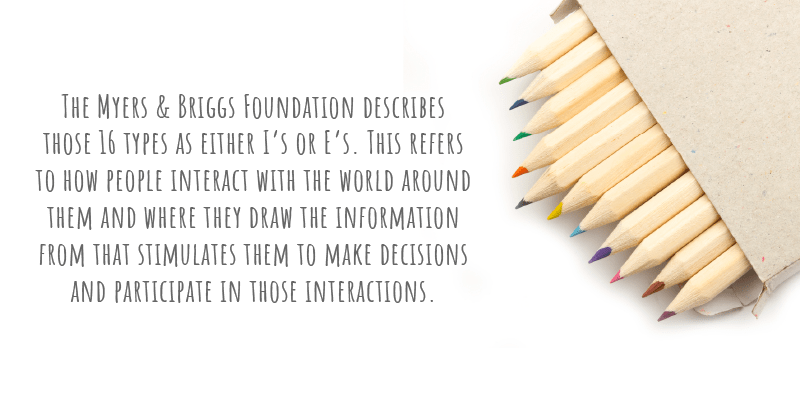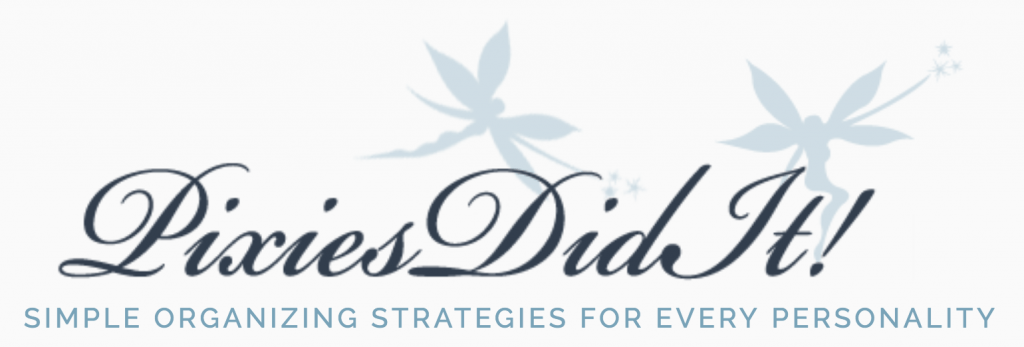Myers-Briggs Equivalent of Smart Pixie Types
When we set out to organize the world (just joking… we know that is way too big a task for any two people)… it did not take long to realize that first we had to organize the people. By this, we mean taking into account people’s natural tendencies and assessing their strengths to help them get (and stay) organized based on their personality type. In other words, if you work with us, we will work with you as an individual and as one of the Organizational Solution Types (OST) that we discovered lineup so well with Myers-Briggs Types (MBT).
We developed a test for you to take to help determine your OST. There are 4 basic types that we ascribe people’s personalities to: Organics, Smarts, Funs, and Classics. Inside of these we have some subtypes, and each of those are matched to one or more of the 16 Myers-Briggs types. Taken together, you can not only learn a lot about yourself, but also about how you keep your space organized (or not so organized).
Myers-Briggs

The Myers & Briggs Foundation describes those 16 types as either I’s or E’s. This refers to how people interact with the world around them and where they draw the information from that stimulates them to make decisions and participate in those interactions. Each of the 16 unique Myers-Briggs types has a set of preferences. Reading through these, if you have never had a Myers-Briggs test, you will probably find that one of these exactly describes you:
The I’s Have It Going On in Myers-Briggs
- ISTJ. Quiet, serious, earn success by thoroughness and dependability. Practical, matter-of-fact, realistic, and responsible. Decide logically what should be done and work toward it steadily, regardless of distractions. Take pleasure in making everything orderly and organized – their work, their home, their life. Value traditions and loyalty.
- ISFJ. Quiet, friendly, responsible, and conscientious. Committed and steady in meeting their obligations. Thorough, painstaking, and accurate. Loyal, considerate, notice and remember specifics about people who are important to them, concerned with how others feel. Strive to create an orderly and harmonious environment at work and at home.
- INFJ. Seek meaning and connection in ideas, relationships, and material possessions. Want to understand what motivates people and are insightful about others. Conscientious and committed to their firm values. Develop a clear vision about how best to serve the common good. Organized and decisive in implementing their vision.
- INTJ. Have original minds and great drive for implementing their ideas and achieving their goals. Quickly see patterns in external events and develop long-range explanatory perspectives. When committed, organize a job and carry it through. Skeptical and independent, have high standards of competence and performance – for themselves and others.
- ISTP. Tolerant and flexible, quiet observers until a problem appears, then act quickly to find workable solutions. Analyze what makes things work and readily get through large amounts of data to isolate the core of practical problems. Interested in cause and effect, organize facts using logical principles, value efficiency.
- ISFP. Quiet, friendly, sensitive, and kind. Enjoy the present moment, what’s going on around them. Like to have their own space and to work within their own time frame. Loyal and committed to their values and to people who are important to them. Dislike disagreements and conflicts, do not force their opinions or values on others.
- INFP. Idealistic, loyal to their values and to people who are important to them. Want an external life that is congruent with their values. Curious, quick to see possibilities, can be catalysts for implementing ideas. Seek to understand people and to help them fulfill their potential. Adaptable, flexible, and accepting unless a value is threatened.
- INTP. Seek to develop logical explanations for everything that interests them. Theoretical and abstract, interested more in ideas than in social interaction. Quiet, contained, flexible, and adaptable. Have unusual ability to focus in depth to solve problems in their area of interest. Skeptical, sometimes critical, always analytical.
E is For Excellent in Myers-Briggs
- ESTP. Flexible and tolerant, they take a pragmatic approach focused on immediate results. Theories and conceptual explanations bore them – they want to act energetically to solve the problem. Focus on the here-and-now, spontaneous, enjoy each moment that they can be active with others. Enjoy material comforts and style. Learn best through doing.
- ESFP. Outgoing, friendly, and accepting. Exuberant lovers of life, people, and material comforts. Enjoy working with others to make things happen. Bring common sense and a realistic approach to their work, and make work fun. Flexible and spontaneous, adapt readily to new people and environments. Learn best by trying a new skill with other people.
- ENFP. Warmly enthusiastic and imaginative. See life as full of possibilities. Make connections between events and information very quickly, and confidently proceed based on the patterns they see. Want a lot of affirmation from others, and readily give appreciation and support. Spontaneous and flexible, often rely on their ability to improvise and their verbal fluency.
- ENTP. Quick, ingenious, stimulating, alert, and outspoken. Resourceful in solving new and challenging problems. Adept at generating conceptual possibilities and then analyzing them strategically. Good at reading other people. Bored by routine, will seldom do the same thing the same way, apt to turn to one new interest after another.
- ESTJ. Practical, realistic, matter-of-fact. Decisive, quickly move to implement decisions. Organize projects and people to get things done, focus on getting results in the most efficient way possible. Take care of routine details. Have a clear set of logical standards, systematically follow them and want others to also. Forceful in implementing their plans.
- ESFJ. Warmhearted, conscientious, and cooperative. Want harmony in their environment, work with determination to establish it. Like to work with others to complete tasks accurately and on time. Loyal, follow through even in small matters. Notice what others need in their day-by-day lives and try to provide it. Want to be appreciated for who they are and for what they contribute.
- ENFJ. Warm, empathetic, responsive, and responsible. Highly attuned to the emotions, needs, and motivations of others. Find potential in everyone, want to help others fulfill their potential. May act as catalysts for individual and group growth. Loyal, responsive to praise and criticism. Sociable, facilitate others in a group, and provide inspiring leadership.
- ENTJ. Frank, decisive, assume leadership readily. Quickly see illogical and inefficient procedures and policies, develop and implement comprehensive systems to solve organizational problems. Enjoy long-term planning and goal setting. Usually well informed, well read, enjoy expanding their knowledge and passing it on to others. Forceful in presenting their ideas.
Pixies Type Organic: Myers-Briggs ENFJ, INFJ, ENFP and INFP

The Organics are dreamers, idealists, and those who place personal growth and relationships above all else. As the name implies, you let order develop naturally and feel best about who you are when you’re helping make a difference in the world — whether through work or your personal relationships. There’s just something meaningful about helping people reach their potential. Our mom is an Organic and was an art therapist for years. When she retired, a patient’s daughter sent her a thank you letter for helping her mom get well. To her, this was tangible validation for her career, better than a retirement gift. Most other personality types would’ve appreciated a watch or plaque more. You make up less than a quarter of the American population (16%), and often feel alone in your battle to place authenticity and meaning ahead of achievement and ambition.
The Organic Structures (ENFJ & INFJ) among you prefer structure and planning, while the Organic Freedoms (ENFP & INFP) can take life as it comes and prefer less planning. (Source).
Pixie Type Smarts: Myers-Briggs EFSP, IFSP, ENTP, and INTP
The Smarts are inventive and clever, and the architects of change in this world. Somehow, you’ve always known this and it’s one of the reasons you’re rather unique. You’re the ones who always end up running things even if you consciously try not to do it. You make up only 10% of the American population, and yet most CEOs, presidents, and people in charge, etc. are Smarts. It’s probably because you’re intellectually curious and adept complex problem solvers — perfect born leaders, and maybe even a little bit smarter than the next fellow. You are analytical, driven and set a high standard for everyone, including yourselves. While Smart Structures (ENTJ & INTJ) prefer structure and planning, Smart Freedoms (ENTP & INTP) take life as it comes. (Source).
Pixie Type Funs: Myers-Briggs Types ESTP, ISTP, ESFP, an ISFP
The Funs are adventurous and creative. Personality quizzes never seem to completely capture you. Or rather, you guys are the ones who say to us, “I’m not one specific personality type. I am a little bit of them all.” Or, “I don’t believe in that crap.” Pretty much whenever we hear that we know exactly who you are: A Fun. Yes, you are easy-going, sometimes adventurous, and adept at living in the moment. However, you are also firmly grounded in reality and the practical details of life and work, which means bills get paid and work gets done even if you misplaced or have never had a To-Do list. Focused on the here and now, Funs get things done but are flexible about the when and how — thriving at improvising in the moment to solve problems and meet deadlines. You make up about a quarter of the American population (27%) and tend to trust your five senses over less tangible concepts and ideas. Funs (SP), like Classics (SJ), are separated into two different types based on whether they use logic or subjective criteria to make decisions. (Source).
Pixie Type Classics: Myers-Briggs Types ESTJ, ISTJ, ESFJ, ISFJ

The Classics are more traditional and organized. It’s not surprising that when people picture the age-old stereotypical fanny pack wearing American tourist, they’re usually Classics (SJ) — because you are most Americans, even if most of you had the good sense to ditch your fanny packs. Classics make up almost half of the American population (46%) and are most likely responsible for the American stereotypes of tradition, hard work, and loyalty. No, you’re not always traditional but you usually finish what you start, you’re rarely described as slackers and you make dependable friends. You feel best about life when striving toward a goal and getting things done. You love being organized and always try to create routine and structure in your life.
When it comes to home and life issues, you guys probably have the easiest time running a home, your lives, and getting things accomplished. You were born with the skills needed to run a tight ship no matter what the ship. The only things you tend to have trouble with is the big picture skills needed for the grand scheme of things — designing furniture layouts, picture hanging, etc. What’s easiest for you is being on time; what’s hardest is interior design. Classics are either more logical or more subjective. (Source).
We recognize that you are an individual among your type and look forward to getting to know you personally!
